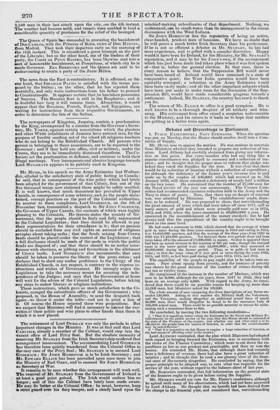The retirement of Lord DURHAM was only the prelude to
other important changes in the Ministry. It was at first said that Lord CARLISLE, already a member of the Cabinet, would step into the 'vacant office of Lord Privy Seal. But the absolute necessity of removing Mr. STANLEY from the Irish Secretaryship rendered that arrangement inconvenient. The accommodating Lord Gonsatcu has therefore been quietly transferred from the Colonial Office to the easy care of the Privy Seal ; Mr. STANLEY is to succeed Lord GODERICH; Sir JOHN HOBHOUSE is to be Irish Secretary ; and
'
r. EDWARD ELLICE has been prevailed upon once more to join the Ministry of Earl GREY, and to succeed Sir JOHN HOBHOUSE as Secretary at War. It remains to be seen whether this arrangement will work well. The removal of Mr. STANLEY from the Government of Ireland is at least a good point gained. The Irish would endure him no longer; and of this the -Cabinet have lately been made aware. Ile may do better at the Colonial Office: he must, however, keep ts strict guard over his fiery temper, and a steady hand upon the
mischief-making subordinates of that 'department. Nothing, we understand, can be much worse than its management in the recent discussions with the West Indians.
Sir Jonpr 11013H0USE has the reputation of being an active, clear-headed, prudent man of business. We have no doubt that he will prove a much better -Irish Secretary than his predecessor. If he is not so efficient a debater as Mr. STANLEY, he has had more experience, and is gifted with a sounder discretion. Happy would it have been for Ireland, for the Ministry, for Mr. STANLEY'S reputation, and it may be for Sir JOHN'S own, if the arrangement which has just been made had taken place when it was first spoken of—that is, before the general election. In that case, there is every reason to believe that the Suppression Bill would never have been heard of. Ireland would have remained in a state of comparative quiet; the West India question would have been equitably arranged; a reduction in the Army Estimates would have been easily made; and all the other important subjects which have been put aside to make room for the discussion of the Sup- pression Bill, would have made considerable progress towards a settlement. Indeed, Mr. STANLEY, the country has much to thank you for.
The return of Mr. ELLICE to office is a good symptom. He is well known to be a thorough despiser of all trickery and trim- ming. His retirement from office raised a suspicion unfavourable to the Ministry, and his return to it leads us to hope that matters are getting in a better train again.


















 Previous page
Previous page